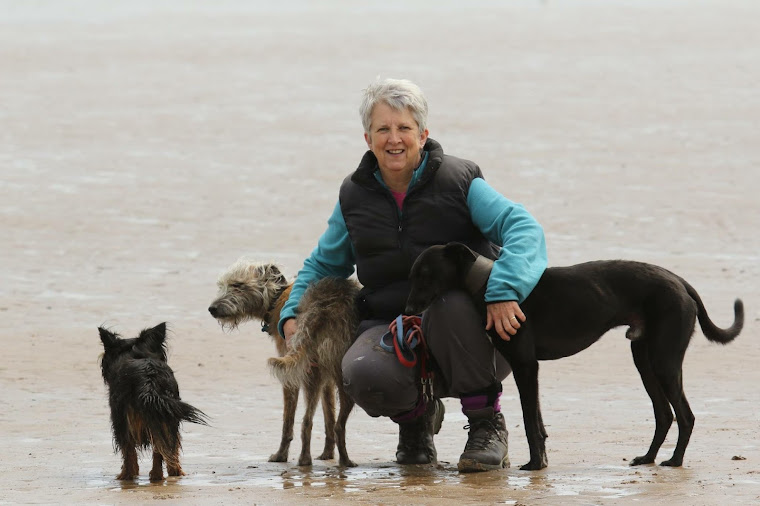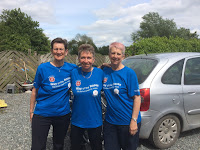Well it seemed a good idea for two sisters to plan a coast to coast cycle challenge on New Years Eve, having drunk copious amounts of alcohol .
After all these things are talked about but never come off......
Then Liz (the fit one in the centre) jumped aboard and it became all the more real.
So a few months of 'training' and on May 22nd 2017 we set off to conquer the beautiful Way of the Roses.
Three women of a certain age calling themselves Team Intrepid but Decrepit raising money in memory of Gill's nephew, Adrian who took his own life in November last year, aged just 33 years.We knew that some ultra fit people have done the route in a day but we decided sensibly to take four and enjoy the views with frequent breaks and make it a bit of a holiday with a difference. Our first long cycle tour.
The team.
- Gill. (right in pic)...role...medic and accommodation organiser. Road bike.
- Liz (the fit one)...role.... bike mechanic and route finder. Tourer.
- Chrissie (left in pc)...role...route finder and seeker of sustenance. Hybrid.
Day 1
Having had a peaceful and very comfy night at the Berkeley B&B in Morecambe, and with a good breakfast on board we set off for Settle. A warm, dry day to be thankful for. We knew this would be a reasonably hilly start (Gill had yet to tackle a hill) and so we organised a shortish route of 35 miles which we managed in a fresh faced and enthusiastic way. It was great, if tiring in the heat but that beer when we had finished the days ride was like nectar especially as it was garnished with a great sense of achievement. We then made the mistake of going to look at the hill out of Settle.....
Day 2
THAT hill out of Settle. It is no laughing matter. The hill is a 16-20%gradient which climbs 1000ft over 1.5 miles out of the town ...it was not a good idea to start the day with tired legs, no warm up or run up, cobbles to start and then a steep ascent. On reflection we should have included it in the first day and headed for Cracoe for our overnight stop. Liz, all but made it, Chrissie had a good old go but then a bad gear change stuffed her attempt. I really tried but ended up pushing the bike up some of it which was also bloody hard work on a very hot day. This was a tough day all round although the views were stunning. I did really struggle at times. Chrissie and Liz's hill training back in Portsmouth paid off for them. The descents were of course wonderful but there was hill after hill and I was ready to give up at one point except there was no choice but to continue on the route. Greenhow Hill is another b*****d although we were headed in the 'kinder' direction. A long, very steep and winding descent with tight turns around bends (make sure that your brakes are working well).
With each hill Liz, winched her way up in a very low gear with some sheer strength and determination.,Chrissie chanted 'my head is strong, my legs are strong' and just got to the top every time in her own way, like a traction engine. I chanted 'I hate hills, I hate hills and wish I had done some hill training.'
Here I am at the top of Settle Hill...
Day 3...
A wonderful overnight stay at Boxtree Cottages in Ripon really set us up well for the day ahead. The route heads for Pocklington via York and Stamford Bridge and we decided to hole up at my place near Howden overnight and so we ended up riding 75 miles today. It was good riding though. Some 'undulations' were described (these are hills but softer ones) but on the whole this was a lovely day. Hot and sunny again. We stopped in York for a sarnie and enjoyed the cycle path out of the City. We were pleased to get to mine for a much needed meal and shower. I had really got to know my bike by now, my gear changes (and anticipation of what was needed) was much improved and my legs stronger than ever, if a little stiff. Interesting that I sailed through this day (compared to others that is) on the flat (which is absolutely what I am used to) whereas Chrissie and Liz found the lack of positional changes offered by a varied terrain caused their shoulders to ache somewhat.
Day 4...
Back to Pocklington from mine plus a few add ons gave us something in the realm of 66 miles today. Bridlington via Driffield and some of the beautiful surrounding villages. A few sneaky ascents today (Millington Hill is one to note, hard work in the heat) through the beautiful wolds and some glorious scenery to take in. Another great day's riding.
A much kinder day with the scent of the finishing point in our nostrils. To arrive in Bridlington and know that we had achieved what we had set out to do was just fantastic.
A very welcome cup of tea at the Bluebell Guest House on our arrival and fish and chips at the harbour to end our day.
Team Intrepid but Decrepit nailed it!!! Now just the 60 miles home to pedal.........
Tips......
- Pack light. Your baggage really affects your ride. You need less than you think.
- Add SIS tablets in your water bottle especially if it's hot. They really helped to reduce fatigue.
- Do some training. This route is described as moderate in difficulty. There are some really challenging hills.
- Take a map if like us you were unsupported.
- Take breaks and be aware of each other.
- Remember those stretches at the end of the day.
A few thankyous to...
- My brilliant team mates.It's been a pleasure.
- The weather...glorious sunshine all the way.
- Sustrans for a really lovely and on the whole very well signed route.
- My bike (christened Alex en route) who I now know a whole lot better.
- The supporters who raised all the money. You are priceless (over £2,000 to C.A.L.M.).
- The man who ran out of Wetherspoons in Ripon to give us a tenner and the lady who emptied her purse while we were having a sarnie somewhere. Touching.
- Our partners for the cheers and support..
- My legs












